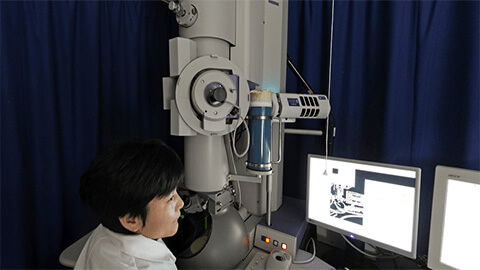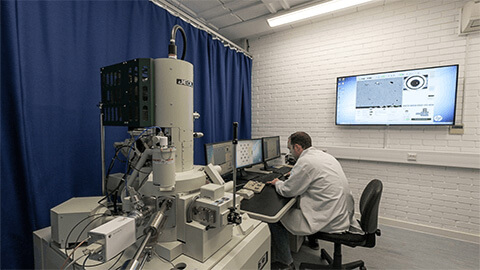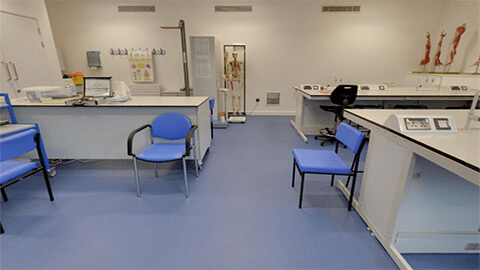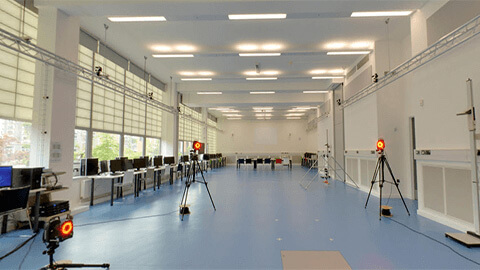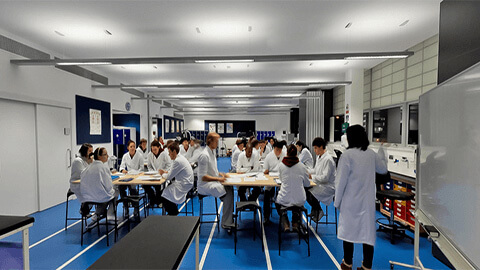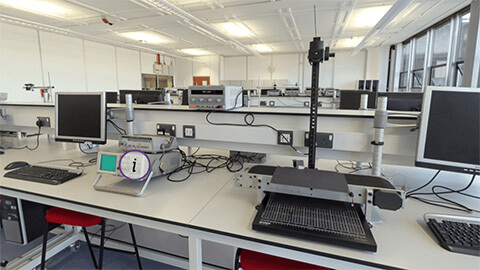Biomedical Engineering BEng (Hons) degree
4 years full-time with placement year or 3 years full-time
- Typical offer
- AAB Entry requirements
- Fees for 2026-27 (per academic year)
-
UK: £9,790International: £30,700Fees
- UCAS codes
-
4 years full-time with placement year: H1613 years full-time: H160
- Start date
- September 2026
- Institute code
- L79
- Subject area
- Biomedical Engineering
Overview
Biomedical Engineering uses engineering practices and principles to analyse and design new products, processes, tools and techniques. This helps to bridge gaps across biological and healthcare challenges. It plays an integral role in global issues where the challenge requires a bioengineering response.
Our Biomedical Engineering degree will give you a thorough grounding in engineering systems and applications relevant to bioengineering. You will also gain a sound understanding of human anatomy, physiology and biological functions and the ability to apply your knowledge and skills to biomedical engineering problems.
The field is rapidly developing. Biomedical Engineers work in a variety of global sectors developing products and creating technology to help people achieve a better quality of life and break barriers in medical and sporting achievements.
Examples include prosthetics and biomaterial implants, software engineering for advanced and 3D medical imaging, image-guided and robot-assisted surgery, regenerative medicine against incurable diseases, tissue engineering such as bioengineered skin for wounds, 3D bioprinting, medical device development and new assistive technologies (wearable technology, mobile and e-health).
At Loughborough, this course will take you from fundamental science and engineering to the cutting-edge of the subject. During your time with us, you will have access to our state-of-the-art experimental labs to complement your lectures.
In year three, you will have the opportunity to complete a research project on a specific topic of interest supervised by a member of the academic staff.
What's the difference between MEng and BEng?
The first three years of the MEng and BEng share the same content to ensure a thorough grounding in engineering and biological concepts, with a good mix of theory, application and practical content from day one. The MEng differs from the BEng course in the fourth year, when MEng students are required to study a wider range of technical subjects with additional depth. It is possible to transfer from a BEng to an MEng from the start of the course up to the end of the second year, providing that transfer progression criteria have been met.
Why you should choose us
*based on data from the National Student Survey 2025. All underpinning survey responses that contribute to this can be found on the OfS website.
Why you should study this course
Biomedical Engineering is an interdisciplinary course. It brings together experts from Chemical Engineering, Materials, Mechanical and Manufacturing, Electrical and Electronic Engineering. You will also benefit from the expertise in our internationally renowned School of Sport, Exercise and Health Sciences.
This course represents the latest knowledge in this rapidly developing discipline. Our National Centre for Sport and Exercise Medicine delivers world-class education, research and clinical services to benefit the health and well-being of the nation, from people at risk of ill health to elite athletes.
Since 2009, our Centre for Biological Engineering has successfully developed the interface between engineering, biology and medicine attracting over £20 million of external investment.
The University has invested heavily in teaching facilities with the £17 million STEMLab, 3,500 m2 of modern student-focused laboratory facilities. This is specifically reserved for teaching, including science and engineering laboratories, workshop and electronics facilities, and design and computer suites. This combined with the teaching facilities in West Park Teaching Hub, builds a dynamic and innovative engineering quarter of the university campus.
Professional recognition
Our Biomedical Engineering BEng and MEng programmes are Engineering Council accredited degrees, accredited by the Institute of Mechanical Engineers (IMechE). This accreditation supports our graduates to gain Chartered Engineer status.
We encourage our undergraduate students to join the IMechE as an Affiliate Member which is free for undergraduate students studying a STEM degree. IMechE membership benefits include access to career advice and tips, networking opportunities and online resources.
What you'll study
Excited to learn more? See below for a taste of what you can expect to study for our Biomedical Engineering BEng (Hons) degree.
The information below is intended as an example only, featuring module details for the current year of study. Modules are reviewed on an annual basis and may be subject to future changes – revised details will be published through Programme Specifications ahead of each academic year. Please also see Terms and Conditions of Study for more information.
Semester 1 & 2
Compulsory
Design and Make Project 1
The aims of the module are:
- To provide students with an understanding of the basic engineering and life science principles used in designing and making exemplar bioengineering products;
- To provide a practical experience of a series of laboratories relating design concepts to product properties.
Chemical Engineering Science
The aims of this module is to:
- Equip students with core chemical and biological knowledge underpinning Chemical Engineering.
- Introduce the principles of sustainability in chemical/biochemical processes.
- Introduce students to industrially significant aspects of chemical/biochemical processes and microbiology.
- Familiarise students to risk analysis procedures and experimental planning processes.
Mathematical Methods in Bioengineering
The aims of this module are to reinforce and extend student's previous exposure to mathematics with an emphasis on the techniques required to solve problems arising in bioengineering.
Introductory Materials Science
The aim of this module is:
- To give the students an introduction to engineering materials, their properties and processing and how these are interrelated.
- To provide students with an understanding of the major principles used in determining the properties and structure of materials.
- Introduction to processing a range of material types from raw material to finished part
- How the processing method can influence the properties of the material
Anatomy and Physiology
The aim of this module is to develop the students' understanding of the structure, function and homeostatic regulation of the human body with reference to integumentary, skeletal, muscular, nervous, cardiovascular, respiratory, digestive, immune, endocrine and reproductive systems.
Integrated Product Design
The aim of this module is for students to understand the integrated nature of Product Design and technology. Students will gain an introduction to:
- The processes of creating design information through applied Computer Aided Design (CAD) methods.
- Reading graphical engineering design information.
- The design and implementation of engineering related software and programming.
- Electronics and technology
- CAD based simulation for modelling
Semester 1 & 2
Compulsory
Design and Make Project 2
The aims of the module are:
- To enable students to develop detailed knowledge of the principles used in designing and making exemplar bioengineering products;
- To enable students to demonstrate their understanding and skills to complete dedicated biomaterials, Electrical Engineering (EE) and scaffold fabrication mini projects, and a series of well-structured tissue manufacturing experiments relating to the process design for engineered tissue(s) or organ(s).
- To enable students to analyse and communicate the principles of design in solving bioengineering problems including the complex processes for bioengineering product(s) through combinational skills.
Bioengineering Thermofluids
The aims of this module are to:
- Introduce the fundamental concepts of thermodynamics and fluid mechanics.
- Solve practical engineering problems using thermodynamics and fluid mechanics principles.
Data Analysis and Modelling
The aims of this module is to introduce the principles of data analysis and modelling relevant to materials and chemical engineering.
Digital Systems
The aims of this module are to develop an understanding of the key concepts of electronic logic and how signals and systems are represented on digital platforms.
Semester 1
Compulsory
Biochemistry and Cell Biology
The aim of this module is to further student understanding of the fundamental aspects of biochemistry and cell biology that underpin the wider study of human biology.
Semester 2
Compulsory
Materials Characterisation
The aim of the module is to develop the understanding of materials characterisation techniques to accurately determine the structure of materials at microscopic or atomic level.
Biomaterials 1 (Biomaterials for Tissue Engineering)
The aims of the module are to:
- to provide students with an understanding of the types of materials used in tissue engineering
- to relate the mechanical/physical/chemical properties of a material with its correct use in the different biological tissues
- to consider the design and development of devices to replace or augment damaged or diseased body parts.
Semester 1 & 2
Compulsory
Bioengineering Individual Project
The aim of the module is to impart the skills required:
- To develop and conduct a research programme in the field of bioengineering
- To communicate the findings, orally and in writing, to a technical audience.
Biomedical Component Design
The aims of this module are for the student to:
- understand how to use basic design principles, including an appreciation of design requirements, constraints and approaches;
- use the principles of materials selection in conjunction with biological requirements, and the different approaches adopted in commercial material selection systems in a regulated industry;
- integrate their knowledge of biomaterials properties, manufacturing techniques and engineering principles in the solution of practical biomedical design problems.
Optional
Body Composition and Physiological Measurement
The aims of this module are for the student to understand the biological bases and methods for assessing the composition and function of the human body and to critically evaluate the reliability and validity of techniques and their applicability in different populations.
Semester 1
Compulsory
Data Analysis
The objective of this module is to introduce (mainly statistical) methods for the analysis of data generated from experiments, plant trials or production. Students will gain an understanding of how confidence levels can be used to quantify uncertainty in data and shape the conclusions that can be drawn from them, to then inform decision making and resulting actions.
Optional
Biochemical Engineering
The aims of this module are:
- To enable students to analyse biological processes based on an understanding of the principles involved
- To develop strategies for processing biological materials based on available technologies
- To give examples of industrially relevant processes.
Bioelectricity and Biophotonics Engineering
The aims of this module are to:
- Introduce the fundamentals of bioelectricity and biophotonics at molecular, cellular and tissue levels
- Explore engineering principles underpinning selected biomedical applications.
Additive Manufacturing for Product Development
The module will introduce and develop the concepts of seven Additive Manufacturing (AM) process categories. The module will emphasise the strengths and weaknesses of the various technologies and will highlight applications and case studies from the Additive Manufacturing (AM) industry.
Semester 2
Compulsory
Product Innovation Management
The aim of this module is for students to gain an understanding of strategic and operational issues and demands related to product innovation management through a series of lectures covering an appreciation of market dynamics and their effect on the design of new products, including the development of appropriate management strategies.
Healthcare Engineering
Optional
Biomaterials 2 (Biomaterials for Drug Delivery)
The aims of the module are to:
- to provide students with an understanding of the types of materials used in controlled delivery
- to relate the mechanical/physical/chemical properties of a material with its correct use for different types of delivery
- to consider the design and development of new materials and structures that can target delivery to specific organs/tissues and in specific timeframes.
Regenerative Medicine
The aim of this module is to develop an understanding of regenerative medicine that utilises biology as the basis for modern regenerative therapies.
Emerging Technologies for Sport, Health and Wellbeing
The aim of this module is for students to develop a multidisciplinary knowledge and understanding of recent emerging technologies that can aid with improving health and wellbeing. This is inclusive of clinical devices to active lifestyle aids, and the module will cover topics including how they are developed, how they can be applied, and how to utilise them in research and practice.
Sports Engineering
The aim of the module is for students to gain an understanding of the science and materials relating to sports equipment design and manufacture and to appreciate the significance of this industry sector.
How you'll study
- Lectures
- Tutorials
- Independent study
- Group work
- Supervision
- Laboratory work
- Practical sessions
How you'll be assessed
Students are assessed by a mixture of coursework and written examinations.
The course is highly interactive with a wide range of teaching methods, so assessments vary from module to module, but overall the approximate ratio is 60/40 exams/coursework. Modules containing design-orientated work, individual and group projects are also assessed by oral presentation, and in some cases poster/video presentation to allow entrepreneurial, team working and leadership skills development.
Placement year
This course includes the option to complete a paid year working in industry. Our close links with industrial partners enable us to provide our students with considerable help in sourcing and securing their placement.
Placements are an excellent opportunity to gain real-world experience and apply the knowledge from your degree in practice. Many of our students return with a much better understanding of the wider context of the modules they have studied and generally perform better in their final year(s) of study.
In addition, the placement year will allow students to ‘test drive’ an industrial sector. It will give students insight into what they can expect from a graduate position before having to commit to a longer-term career. Placements are a great stepping-stone into a permanent job. We see many of our students return to their placement employer as a graduate because they have demonstrated their worth to the organisation.
Please note that whilst the Department offers great support for students to find a placement, it is ultimately the student's responsibility to source and secure their industrial placement.
Additional award
By undertaking a year on professional placement or working in industry, you will gain an additional award alongside your final qualification. If you undertake a professional placement year you will gain a Diploma in Professional Studies (DPS) or if you complete a year in industry you will gain a Diploma in Industrial Studies (DIS).
The types of companies we work with include:
Our strong industry links help our students to advance their skills and add to their CV through placements with a wide range of organisations.
Our students have previously undertaken placements with organisations including: 3P Innovation, GE, GlaxoSmithKline, Fujifilm Diosynth Technologies, Johnson & Johnson, Oxford Immunotec, Pfizer, Proctor & Gamble, Renishaw, Siemens Healthineers, Roche, Unilever and many small-to-medium biotechnology enterprises.
Study abroad
If you are interested in travelling whilst you study, there are options to study overseas with our partner universities. By choosing this course you'll have the option to take advantage of this exciting opportunity, giving you the chance to not only experience new cultures and visit exciting destinations, but also to expand your learning experience. The length of a study abroad placement would be confirmed by your School or Department.
Additional award
This course comes with the option to study abroad for a year, at the end of which you will gain a Diploma in International Studies (DIntS). This is an additional award to the final qualification you will receive once you have successfully completed this course.
Where you'll study
In this highly interdisciplinary subject, you will benefit from expertise across a range of schools and departments, as well as the equipment and facilities on offer there.
STEMLab is a state-of-the-art laboratory facility which forms part of a wider £25M investment in the West Park of our campus, the home of our Engineering Schools, which includes an adjacent student learning and teaching hub.
STEMLab allows us to offer new ways to learn and collaborate, with ‘drop-in’ engineering workshops run through Loughborough University Careers Network, teaching laboratories, computer-aided design and rapid prototyping facilities, a design studio and informal learning spaces. These enhanced facilities will further increase our ability to train and develop skilled graduates that are targeted by major employers from across the world.
Entry requirements
To learn more about the qualifications we typically accept, please select your country from the drop-down menu below.
United Kingdom
- Typical A level offer
-
AAB including Maths with one from Chemistry, Biology and Physics
- Typical IB offer
-
35 (6,6,5 HL) including Maths HL and one of Biology, Chemistry or Physics at HL
- Typical BTEC offer
-
BTEC Level 3 National Extended Diploma in a relevant subject: DDD plus A Level Maths at grade B
BTEC Level 3 National Diploma in a relevant subject: D*D plus A level Maths at Grade B
BTEC Level 3 National Extended Certificate: D* plus A level Grades AB to include Maths and either Chemistry Physics or Biology
Preferred BTEC: Engineering, Mechanical or Manufacturing
- GCSE
-
GCSE English Language grade 4/C
- Access Loughborough Contextual Offer
-
A level: BBB including Maths with one from Chemistry, Biology and Physics
A level and BTEC Level 3 National Extended Certificate: BB including Maths and Chemistry, Biology or Physics, and Distinction
We make lower grade offers to students who may face barriers to university study. Check out the eligibility criteria for receiving an Access Loughborough Contextual Offer.
If you don’t meet the Access Loughborough eligibility criteria but have circumstances that may have impacted your academic achievements, then we may take this into account when considering your application. Check out our Contextual Admissions Policy for what we consider and how it may be used.
- Other
-
T Levels in Engineering and Manufacturing: Maintenance, Installation and Repair for Engineering Manufacturing; Engineering, Manufacturing, Processing and Control and Design and Development for Engineering Manufacturing are considered. Distinction overall with A in core component plus B in A level Maths.
We also accept many other qualifications in addition to those outlined above and further information about these can be found in our general entry requirements.
Selection
Applicants are usually selected based on their UCAS application, but in exceptional cases, an interview may be required. If applicants are made an offer of a place, they will be invited to visit the department giving them the opportunity to meet staff and students, see facilities and get an insight into what it is like to be a student at Loughborough.
Many of our courses receive a large number of applications for each available place. We cannot unfortunately always make offers to all applicants who are predicted to achieve/have achieved grades in line with our advertised typical offers.
Australia
Typical offers for students from Australia are based on the Australian Tertiary Admissions Rank (ATAR). Typically, we would require a score between 85.00 and 94.00. For students from Queensland, requirements from the Overall Position (OP) would typically be between 8 and 4.
Further to the above, students would normally be required to pass one of the following qualifications:
- ACT Year 12 Certificate
- New South Wales Higher School Certificate (HSC)
- Northern Territory Certificate of Education (NTCE)
- Queensland Certificate of Education (QCE)
- South Australian Certificate of Education (SACE)
- Tasmanian Certificate of Education (TCE)
- Victorian Certificate of Education (VCE)
- Western Australian Certificate of Education (WACE)
Where courses have specific subject requirements, these will be expected to be studied within one of the above qualifications. Grades of ‘B’ (ACT, NTCE, SACE, VCE, WACE), ‘4’ (HSC), ‘CA’ (TCE), ‘HA’ (QCE) or higher will normally be required.
English language studied within one of the above qualifications is normally sufficient to meet the university’s minimum entry requirements. Please see the Approved Qualifications table on the English Language page for further details.
Austria
For students taking the Austrian Reifeprüfung (Matura), we typically require an average score between 2.2 and 1.2 from 6 written or spoken exams. Where courses have specific subject requirements, a score of 2 or 1 will normally be required in each.
English language studied within the above qualification is normally sufficient to meet the university’s minimum entry requirements. Please see the Approved Qualifications table on the English Language page for further details.
Bahrain
Students who have studied the Tawjihiyah/Thanawiya amma (General Secondary Education Certificate) will need to complete a suitable Foundation Year.
Loughborough University offers a Foundation Year through ONCAMPUS. You can view the entry requirements for this on the ONCAMPUS webpage. Alternatively, please contact our Global Engagement team to check if the Foundation Programme that you are considering taking is acceptable for entry to Loughborough courses.
Students with A Level or IB qualifications will be considered for direct entry to undergraduate degree courses. Please see the undergraduate prospectus for specific course requirements. Requirements for American SATs and APs can be found under the country requirements for the USA.
All students must also achieve the University’s English language requirements
Bangladesh
Students taking the Higher Secondary Certificate (HSC) will need to complete a suitable Foundation Year.
Loughborough University offers a Foundation Year through ONCAMPUS. You can view the entry requirements for this on the ONCAMPUS webpage. Alternatively, please contact our Global Engagement team to check if the Foundation Programme that you are considering taking is acceptable for entry to Loughborough courses.
Students with A Level or IB qualifications will be considered for direct entry to undergraduate degree courses. Please see the undergraduate prospectus for specific course requirements.
All students must also achieve the University’s English language requirements.
Belgium
The Certificat d’Enseignement Secondaire Supérieur (CESS) and Diploma van Secundair Onderwijs (DSO) are both acceptable qualifications for direct entry into first year undergraduate courses. We typically require an overall score ranging from 75% to 85%. Where the 20 point marking scale is used, we would typically require marks between 15/20 and 17/20.
Specific subject marks may be required for some courses and where this is the case, this should be studied as a 4-hour subject. Where courses require achievement in GCSE Maths, we would normally look for a score of 50% or higher in Maths within the CESS or DSO.
Students currently studying the Abschlusszeugnis der Oberstufe des Sekundarunterrichts should contact the Undergraduate Admissions Office for further details.
English language studied within one of the above qualifications is normally sufficient to meet the university’s minimum entry requirements. Please see the Approved Qualifications table on the English Language page for further details.
Brazil
Students taking the Brazilian High School Certificate(Certificado de Ensino Médio and Exame Nacional do Ensino Médio – ENEM) will need to complete a suitable Foundation Year.
Loughborough University offers a Foundation Year through ONCAMPUS. You can view the entry requirements for this on the ONCAMPUS webpage. Alternatively, please contact our Global Engagement Team to check if the Foundation Programme that you are considering taking is acceptable for entry to Loughborough courses.
Students with A Level or IB qualifications will be considered for direct entry to undergraduate degree courses. Please see the undergraduate prospectus for specific course requirements.
All students must also achieve the University’s English language requirements.
Brunei
Students with A Level or IB qualifications will be considered for direct entry to undergraduate degree courses. Please see the undergraduate prospectus for specific course requirements.
All students must also achieve the University’s English language requirements.
Bulgaria
For students taking the Diploma za Sredno Obrazovanie, we would typically ask for an overall score ranging from 5.3 - 6.0 overall with specific subject marks required for some courses.
Where courses require achievement in GCSE Maths, we would normally look for a score of 4.5 or higher in Maths within the Diploma za Sredno Obrazovanie.
All students must also achieve the University’s English language requirements.
Canada
Typical offers for students from Canada are based on having completed Grade 12. The information below outlines the requirements for different states:
Alberta, Northwest Territory, Nunavut
- Typical offers are based on an average of best 5 grade 12 courses in the General High School Diploma and offers typically range from 80% - 93%.
- Where courses require specific subjects, these should be taken as thirty-level courses. Where A Level Maths is a course requirement, both Mathematics 30-1 and Mathematics 30-2 should be completed.
- Where courses require achievement in GCSE Maths, we would normally look for a score of 60% or higher in grade 10 Maths.
British Columbia, Yukon Territory
- Typical offers range from ‘BBBBBB’ – ‘AAAAAA’ from best 6 grade 12 subjects in the Senior Secondary Graduation Diploma.
- Where courses require specific subjects these would normally need to be achieved at ‘A’ or ‘B’.
- Where courses require achievement in GCSE Maths, we would normally look for a score of ‘C’ or higher in grade 10 Maths.
Manitoba
- Typical offers are based on an average of best 5 subjects at 300 level in the High School Graduation Diploma and offers typically range from 80% - 93% with specific subject marks required for some courses.
- Where courses require achievement in GCSE Maths, we would normally look for a score of 60% or higher in grade 10 Maths.
New Brunswick, Prince Edward Island, Quebec, Saskatchewan
- Typical offers are based on an average of best 5 grade 12 subjects in the High School Graduation Diploma and offers typically range from 80% - 93% with specific subject marks required for some courses. Where courses require achievement in GCSE Maths, we would normally look for a score of 60% or higher in grade 10 Maths.
Newfoundland & Labrador
- Typical offers are based on an average of best 5 university preparatory level subjects in the High School Graduation Diploma and offers typically range from 80% - 93% with specific subject marks required for some courses.
- Where courses require achievement in GCSE Maths, we would normally look for a score of 60% or higher in grade 10 Maths.
Nova Scotia
- Typical offers are based on an average of best 5 subjects at level 4 or 5 in the High School Completion Certificate and offers typically range from 80% - 93% with specific subject marks required for some courses.
- Where courses require achievement in GCSE Maths, we would normally look for a score of 60% or higher in grade 10 Maths.
Ontario
- Typical offers are based on an average of best 6 grade 12 courses at ‘4U’, ‘4M’ or ‘DU’ in the Ontario Secondary School Diploma and offers typically range from 80% - 93% with specific subject marks required for some courses.
- Where courses require achievement in GCSE Maths, we would normally look for a score of 60% or higher in grade 10 Maths.
Quebec
- Typical offers range from 80% - 93% overall in the Diplome d'Etudes Collegiales with specific subject marks of 80% - 96% required for some courses.
- Where courses require achievement in GCSE Maths, we would normally look for a score of 60% or higher in grade 11 Maths.
English language studied within one of the above qualifications is normally sufficient to meet the university’s minimum entry requirements. Please see the Approved Qualifications table on the English Language page for further details.
China
Students taking the Senior Middle Examinations will need to complete a suitable Foundation Year.
Loughborough University offers a Foundation Year through ONCAMPUS. You can view the entry requirements for this on the ONCAMPUS webpage. Alternatively, please contact our Global Engagement team to check if the Foundation Programme that you are considering taking is acceptable for entry to Loughborough courses.
We will also accept a first year of study at a recognised university of appropriate standing within China as acceptable for entry to the first year of some of our degree courses. We would typically require an overall average ranging from 75% to 80% with specific subject marks required for some courses. Please contact the Global Engagement team who can advise on acceptability for entry to Loughborough courses.
All students must also achieve the University’s English language requirements.
Croatia
For students taking the Croatian Matura (Svjedodžba o Maturi), we typically require an average score between 4.0 and 5.0.
Where courses have specific subject requirements, a score of 4 or 5 will normally be required in each. For courses that require Maths as part of their A Level offer, this should be taken at extended level in the Matura.
All students must also achieve the University’s English language requirements.
Cyprus
The Apolytirion is not accepted for direct entry to the University when studied on its own. However, we are happy to consider students taking the Apolytirion alongside either 1 or 2 A Levels. For courses with typical offer requirements of ‘ABB’, we would typically require 19.5 in the Apolytirion alongside an ‘A’ at A Level or 18.0 in the Apolytirion alongside ‘AB’ at A Level. Where courses require specific subjects, these must be taken at A Level.
Where courses require achievement in GCSE Maths, we would normally look for a score of 17 or higher in Maths within the Apolytirion.
Students taking the Apolytirion without additional A Levels will need to complete a suitable Foundation Year. Loughborough University offers a Foundation Year through ONCAMPUS. You can view the entry requirements for this on the ONCAMPUS webpage. Alternatively, please contact our Global Engagement team to check if the Foundation Programme that you are considering taking is acceptable for entry to Loughborough courses.
All students must also achieve the University’s English language requirements.
Czech Republic
For students taking the Czech Maturita (Vysvědčení o Maturitní Zkoušce), we typically require an average ranging from 2.00 to 1.00 from best 4 subjects with specific subject marks (either 1 or 2) required for some courses.
All applicants must also achieve the University’s English language requirements.
Denmark
For students taking the Bevis for Studentereksamen (STX), typical offers range from 8.0 to 10.5 in the weighted average mark from the STX. Some courses may require marks (either 10 or 12) in specific Level A subjects.
Where courses require achievement in GCSE Maths, we would normally look for a score of 7 or higher in Level C Maths with the STX.
Students who have taken the Studentereksamen under the old grading system would be considered on a case by case basis with an average between 9.0 and 11.0 normally required.
English language studied within one of the above qualifications is normally sufficient to meet the university’s minimum entry requirements. Please see the Approved Qualifications table on the English Language page for further details.
Egypt
Students who have studied the Thanaweya A’ama (Certificate of General Secondary Education) will need complete a suitable Foundation Year.
Loughborough University offers a Foundation Year through ONCAMPUS. You can view the entry requirements for this on the ONCAMPUS webpage. Alternatively, please contact our Global Engagement team to check if the Foundation Programme that you are considering taking is acceptable for entry to Loughborough courses.
Students with A Level or IB qualifications will be considered for direct entry to undergraduate degree courses. Please see the undergraduate prospectus for specific course requirements. Requirements for American SATs and APs can be found under the country requirements for the USA.
All students must also achieve the University’s English language requirements.
Estonia
For students taking the Gümnaasiumi lõputunnistus with the Riigieksamitunnistus, we typically require a high average grade between 4.3 and 4.8 in the Gümnaasiumi lõputunnistus as well as an average percentage between 77% and 90% in the Riigieksamitunnistus.
Specific subject marks may be required for some courses. For Engineering and Science courses, we would expect students to have studied Lai Matemaatika.
Students with a score of 4.0 with 70% average from state exams would be considered on a case by case basis for the Loughborough University Foundation Year
All students must also achieve the University’s English language requirements.
European Baccalaureate
For students taking the European Baccalaureate, we typically require an overall average mark between 78% and 88% with specific subject marks (normally 8.0 or higher from a 4 or 5 period subject) required for some courses.
Where courses require achievement in GCSE Maths, we would normally look for a score of 6.5 or higher in Maths 3.
English language studied within the above qualification is normally sufficient to meet the university’s minimum entry requirements. Please see the Approved Qualifications table on the English Language page for further details. When applying, please state whether you are taking English as Language 1, 2, 3 or 4.
Faroe Islands
Students taking the Studentsprógv would normally be required to achieve a score between 8.0 and 10.5 with specific subject marks (either 10 or 12) required for some courses.
All students must also achieve the University’s English language requirements.
Finland
For students taking the Ylioppilastutkinto / Studentexamen, typical offer requirements would normally be based on achievement in best 4 subjects. Offers will typically be expressed as four letter grades ranging from MMMM (achieve Magna cum laude approbatur or higher in four subjects) to LEEE (achieve Eximia cum laude approbatur or higher in four subjects with at least one subject at Laudatur).
Where courses require achievement in GCSE Maths, we would normally look for a score of 7 or higher in Maths within the Lukion Päästötodistus
All students must also achieve the University’s English language requirements.
France
For students taking the new French Baccalauréat Général (assessed from 2021 onwards), we typically require an overall result between 13.0 – 15.5 with results of 14-15 in two speciality subjects. Specific speciality subjects are required for some courses.
Students following the Option Internationale (OIB) will often receive a slightly lower offer.
Where courses require achievement in GCSE Maths, we would normally look for a score of 10 or higher in Mathematics taken in Year 12 as a Speciality Subject (Première) or a score of 11 or higher in Additional Maths taken as an Option in Year 13 (Terminale).
Students taking the Baccalauréat Technologique will be considered for first year entry on a case by case basis where subjects studied are relevant to the university course applied for.
English language studied within one of the above qualifications is normally sufficient to meet the university’s minimum entry requirements. Please see the Approved Qualifications table on the English Language page for further details.
Germany
Students taking the Abitur typically require an overall score ranging from 1.3 - 2.0 with specific subject marks required for some courses (normally between 12and 15).
Where courses require achievement in GCSE Maths, we would normally look for a score of 7 or higher in Maths within the Abitur.
English language studied within the above qualification is normally sufficient to meet the university’s minimum entry requirements. Please see the Approved Qualifications table on the English Language page for further details.
Ghana
Students taking the WASSCE will need to complete a suitable Foundation Year.
Loughborough University offers a Foundation Year through ONCAMPUS. You can view the entry requirements for this on the ONCAMPUS webpage. Alternatively, please contact our Global Engagement team to check if the Foundation Programme that you are considering taking is acceptable for entry to Loughborough courses.
Students with A Level or IB qualifications will be considered for direct entry to undergraduate degree courses. Please see the undergraduate prospectus for specific course requirements.
All students must also achieve the University’s English language requirements.
Greece
Students taking the Greek Apolyterion are normally required to also take the Panhellenic Exams. Typical offers are based on the General Access Grade in the Panhellenics and range from 16.5 to 19.0 depending on the course applied for. Where courses have specific subject requirements, these should be taken as ‘Direction’ subjects within the Panhellenics. Students applying for Science or Engineering courses would generally be expected to have followed the Sciences direction. We will also normally ask for a mark between 17.0 and 19.0 in the Apolyterion certificate.
Students who have studied 1 or 2 A Levels alongside the Apolyterion (without taking the Panhellenic Exams) would normally be required to obtain high grades in their A Level exams along with an average mark of between 17.0 and 19.0 in the Apolyterion. Where courses have specific subject requirements, these should be taken as A Levels.
Students taking a Foundation course alongside the Apolyterion will be considered on a case by case basis.
Loughborough University offers a Foundation Year through ONCAMPUS. You can view the entry requirements for this on the ONCAMPUS webpage. Alternatively, please contact our Global Engagement team to check if the Foundation Programme that you are considering taking is acceptable for entry to Loughborough courses.
All students must also achieve the University’s English language requirements.
Hong Kong
Typical offers for students taking the HKDSE vary by course and range from ‘5, 4, 4’ – ‘5*, 5, 5’ from best 3 subjects, of which 2 must be electives and excluding Liberal Studies and Chinese. Where courses require specific subjects, we would be looking for grades between ‘4’ and ‘5*’ in these subjects.
For courses that require Maths as part of their A Level offer, this should be taken at extended level in the HKDSE. Where courses require achievement in GCSE Maths, we would normally look for a score of ‘3’ or higher in core Maths.
Students with A Level or IB qualifications will be considered for direct entry to undergraduate degree courses. Please see the undergraduate prospectus for specific course requirements.
English language studied within one of the above qualifications is normally sufficient to meet the university’s minimum entry requirements. Please see the Approved Qualifications table on the English Language page for further details.
Hungary
For students taking the Hungarian Matura (Érettségi Bizonyítvány), we typically require an average ranging from 70% to 83% from best 5 subjects which must include at least 2 higher level exams.
Where courses have specific subject requirements, a score of between 70% and 90% would normally be required in a higher level exam.
All students must also achieve the University’s English language requirements.
Iceland
For students taking the Stúdentspróf, we typically require an overall grade between 8.0 and 9.3 with specific subject marks (between 8 and 10) required for some courses.
English language studied within the above qualification is normally sufficient to meet the university’s minimum entry requirements. Please see the Approved Qualifications table on the English Language page for further details.
India
Typical offers are based on the Standard XII school leaving qualifications. When awarded by CBSE, ISCE or West Bengal Exam Boards, we typically ask for results in the region of 78% - 88% average performance from best 4 subjects. For other state boards, we would be looking for achievement between 83% - 93% from best 4 subjects. Specific subject marks at Standard X or Standard XII may be required for some courses.
Students with A Level or IB qualifications will be considered for direct entry to undergraduate degree courses. Please see the undergraduate prospectus for specific course requirements.
English language studied within one of the above qualifications is normally sufficient to meet the university’s minimum entry requirements. Please see the Approved Qualifications table on the English Language page for further details.
Indonesia
Students who have studied the Ijazah: Sekolah Menengah Atas/Madrasah Aliyah (SMA/MA) will need complete a suitable Foundation Year.
Loughborough University offers a Foundation Year through ONCAMPUS. You can view the entry requirements for this on the ONCAMPUS webpage. Alternatively, please contact our Global Engagement team to check if the Foundation Programme that you are considering taking is acceptable for entry to Loughborough courses.
Students with A Level or IB qualifications will be considered for direct entry to undergraduate degree courses. Please see the undergraduate prospectus for specific course requirements.
All students must also achieve the University’s English language requirements.
Ireland
Students who have taken the Leaving Certificate under the new grading system (post 2016) would normally be required to achieve 5 higher level passes with grades ranging from H2 H2 H3 H3 H3 to H1 H1 H2 H2 H2. Where courses have specific A Level subject requirements, these should be taken at higher level.
If you have taken the Leaving Certificate under the old grading system (pre-2016) our typical offers would be between B1 B1 B2 B2 B2 and A1 A1 A2 A2 A2.
English language studied within the above qualification is normally sufficient to meet the university’s minimum entry requirements. Please see the Approved Qualifications table on the English Language page for further details.
Israel
For students taking the Bagrut, we would require students to have studied at least 21 study units. Typical offers will be based on average percentage from 3 best 5-unit level subjects with requirements ranging from 78% to 92% depending on the course. Please note that we do not use the Optimal Average and do not consider bonus points as part of our offers.
Where courses have specific subject requirements, we would expect these to be studied as a 5-unit subject and look for achievement between 80% and 95%.
All students must also achieve the University’s English language requirements.
Italy
For students taking the Diploma di Esamo di Stato, we typically require an overall score ranging from 85% - 98% overall. Where courses require specific subjects, we would be looking for marks between 8 and 10 in school assessment.
Where courses require achievement in GCSE Maths, we would normally look for a score of 6 or higher in school assessment for Maths.
Students taking the Diploma di Istituto Tecnico will be considered for first year entry on a case by case basis where subjects studied are relevant to the course for which they have applied.
All students must also achieve the University’s English language requirements.
Japan
Students taking the Kotogakko Sotsugyo Shomeisho (Upper Secondary School Leaving Certificate) will need to complete a suitable Foundation Year
Loughborough University offers a Foundation Year through ONCAMPUS. You can view the entry requirements for this on the ONCAMPUS webpage. Alternatively, please contact our Global Engagement team to check if the Foundation Programme that you are considering taking is acceptable for entry to Loughborough courses.
We will also accept a first year of study at a recognised university of appropriate standing within Japan as acceptable for entry to the first year of some of our degree courses. We would typically require an overall average ranging from 75% to 80% with specific subject marks required for some courses. Please contact the Global Engagement team who can advise on acceptability for entry to Loughborough courses.
Students with A Level or IB qualifications will be considered for direct entry to undergraduate degree courses. Please see the undergraduate prospectus for specific course requirements.
All students must also achieve the University’s English language requirements.
Jordan
Students taking the Tawjihi (General Secondary Education Certificate) will need to complete a suitable Foundation Year.
Loughborough University offers a Foundation Year through ONCAMPUS. You can view the entry requirements for this on the ONCAMPUS webpage. Alternatively, please contact our Global Engagement team to check if the Foundation Programme that you are considering taking is acceptable for entry to Loughborough courses.
Students with A Level or IB qualifications will be considered for direct entry to undergraduate degree courses. Please see the undergraduate prospectus for specific course requirements. Requirements for American SATs and APs can be found under the country requirements for the USA.
Students must also achieve the University’s English language requirements.
Kazakhstan
Typical offers for students from Kazakhstan are based on the Nazarbayev Intellectual Schools (NIS) Grade 12 Certificate. Typically, we would require a score between AAA and BBB from Advanced level subjects. Where courses have specific subject requirements, these will be expected to be studied at Advanced level.
English language studied within the Nazarbayev Intellectual Schools (NIS) Grade 12 Certificate is not sufficient to meet the university’s minimum entry requirements. Please see the Approved Qualifications table for further details.
Kenya
Students taking the Kenya Certificate of Secondary Education will need to complete a suitable Foundation Year.
Loughborough University offers a Foundation Year through ONCAMPUS. You can view the entry requirements for this on the ONCAMPUS webpage. Alternatively, please contact our Global Engagement team to check if the Foundation Programme that you are considering taking is acceptable for entry to Loughborough courses.
Students with A Level or IB qualifications will be considered for direct entry to undergraduate degree courses. Please see the undergraduate prospectus for specific course requirements.
English language studied within the above qualifications is normally sufficient to meet the university’s minimum entry requirements. Please see the Approved Qualifications table on the English Language page for further details.
Kuwait
Students who have studied the Tawjihiyah/Thanawiya amma (General Secondary Education Certificate) will need to complete a suitable Foundation Year.
Loughborough University offers a Foundation Year through ONCAMPUS. You can view the entry requirements for this on the ONCAMPUS webpage. Alternatively, please contact our Global Engagement team to check if the Foundation Programme that you are considering taking is acceptable for entry to Loughborough courses.
Students with A Level or IB qualifications will be considered for direct entry to undergraduate degree courses. Please see the undergraduate prospectus for specific course requirements. Requirements for American SATs and APs can be found under the country requirements for the USA.
All students must also achieve the University’s English language requirements.
Latvia
For students taking the Atestāts par Vispārējo Vidējo Izglītību, we typically require a high average grade between 9.2 and 10.0 as well as an average between 87% and 95% from best 4 state exams.
Where courses have specific subject requirements, a score between 87% and 95% will normally be requested in state exams in these subjects.
Students with a score of 8.0 with 80% average from best 4 state exams would be considered on a case by case basis for the Foundation Year.
All students must also achieve the University’s English language requirements.
Lebanon
Students taking the Baccalauréat Général will need to complete a suitable Foundation Year.
Loughborough University offers a Foundation Year through ONCAMPUS. You can view the entry requirements for this on the ONCAMPUS webpage. Alternatively, please contact our Global Engagement team to check if the Foundation Programme that you are considering taking is acceptable for entry to Loughborough courses.
Students with A Level or IB qualifications will be considered for direct entry to undergraduate degree courses. Please see the undergraduate prospectus for specific course requirements.
Students must also achieve the University’s English language requirements.
Lithuania
For students taking the Brandos Atestatas, typical offers generally range from 9.0 – 10.0 overall. We would also typically ask for an average percentage from the best 3 state exams between 80% and 94%. Where courses require specific subjects, we would typically require these to be taken as state exams.
Where courses require achievement in GCSE Maths, we would normally look for a score of 7 or higher in school assessment for Maths.
All students must also achieve the University’s English language requirements.
Malaysia
For students taking either the Matrikulasi (Matriculation Certificate) or the Sigjil Tinggi Persekolahan Malaysian (STPM), we would typically require grades ranging from AAA-BBB from best 3 (core) subjects excluding general studies.
Where courses require achievement in GCSE Maths, we would normally look for a grade C or higher in SPM (Sijil Pelajaran Malaysia) Maths.
For students taking the Unified Examination Certificate (UEC) we would typically require from the best 7 subjects grades ranging 2xA1 5xA2 to 7xB3 in the UEC-SML. Where courses require achievement in GCSE Maths, we would normally look for a grade B6 or higher in Maths.
- Students taking the MARA Diploma will be considered for first year entry on a case by case basis.
- Students with A Level or IB qualifications will be considered for direct entry to undergraduate degree courses. Please see the undergraduate prospectus for specific course requirements.
English language studied within one of the above qualifications is normally sufficient to meet the university’s minimum entry requirements. Please see the Approved Qualifications table on the English Language page for further details.
Malta
For students taking the Advanced Matriculation Exam, typical offers would normally be based on achievement in 2 advanced level subjects (typically between BB and AA) and 3 intermediate level subjects excluding Systems of Knowledge (typically between BCC and AAA).
Where courses have specific subject requirements, a score of B or A will normally be required in an Advanced Level subject. Where courses require achievement in GCSE Maths, we normally look for a score of 4 or higher in Maths within the Secondary Education Certificate (SEC).
Students with A Level or IB qualifications will be considered for direct entry to undergraduate degree courses. Please see the undergraduate prospectus for specific course requirements.
English language studied within one of the above qualifications is normally sufficient to meet the university’s minimum entry requirements. Please see the Approved Qualifications table on the English Language page for further details.
Netherlands
For students taking the Voorbereidend Wetenschappelijk Onderwijs (VWO)., typical offers range from 6.6 to 7.4 average from the VWO with specific subject marks (between 7 and 9) required for some courses.
Students applying for Science or Engineering courses would generally be expected to have followed the Natuur en Techniek stream within the VWO and have taken the Maths D course.
Where courses require achievement in GCSE Maths, we would normally look for a score of 5 or higher in Maths within the VWO.
Students taking the Middelbaar Beroepsonderwijs (MBO Level 4) certificate will be considered for first year entry on a case by case basis where subjects studied are relevant to the university course applied for. Please contact the Undergraduate Admissions Office for further details.
English language studied within one of the above qualifications is normally sufficient to meet the university’s minimum entry requirements. Please see the Approved Qualifications table on the English Language page for further details.
New Zealand
For students taking the National Certificate in Educational Achievement (NCEA) Level 3 typical offers will be based on overall achievement in the NCEA plus a required number of credits achieved at the next level up. For example, where A Level requirements are ABB, we would normally require a Merit overall with 20 Level 3 credits achieved at Excellence.
Where courses have specific subject requirements, these should be studied at Level 3 within the NCEA. Typically, an overall achievement of Merit or Excellence will be required in these subjects.
English language studied within the above qualification is normally sufficient to meet the university’s minimum entry requirements. Please see the Approved Qualifications table on the English Language page for further details.
Nigeria
Students taking the WASSCE will need to complete a suitable Foundation Year.
Loughborough University offers a Foundation Year through ONCAMPUS. You can view the entry requirements for this on the ONCAMPUS webpage. Alternatively, please contact our Global Engagement team to check if the Foundation Programme that you are considering taking is acceptable for entry to Loughborough courses.
Students with A Level or IB qualifications will be considered for direct entry to undergraduate degree courses. Please see the undergraduate prospectus for specific course requirements.
English language studied within one of the above qualifications is normally sufficient to meet the university’s minimum entry requirements. Please see the Approved Qualifications table on the English Language page for further details.
Norway
For students taking the Vitnemål for Videregående Opplæring, typical offers range from 4.00 to 5.25 average of all Final Assessment Grades.
Where courses have specific subject requirements, students will need to achieve a 4 or higher in at least two 140-hour courses.
English language studied within the above qualification is normally sufficient to meet the university’s minimum entry requirements. Please see the Approved Qualifications table on the English Language page for further details.
Oman
Students who have studied the Tawjihiyah/Thanawiya amma (General Secondary Education Certificate) will need to complete a suitable Foundation Year.
Loughborough University offers a Foundation Year through ONCAMPUS. You can view the entry requirements for this on the ONCAMPUS webpage. Alternatively, please contact our Global Engagement team to check if the Foundation Programme that you are considering taking is acceptable for entry to Loughborough courses.
Students with A Level or IB qualifications will be considered for direct entry to undergraduate degree courses. Please see the undergraduate prospectus for specific course requirements. Requirements for American SATs and APs can be found under the country requirements for the USA.
All students must also achieve the University’s English language requirements.
Pakistan
Students taking the Intermediate/Higher Secondary School Certificate (HSSC) will need to complete a suitable Foundation Year.
Loughborough University offers a Foundation Year through ONCAMPUS. You can view the entry requirements for this on the ONCAMPUS webpage. Alternatively, please contact our Global Engagement team to check if the Foundation Programme that you are considering taking is acceptable for entry to Loughborough courses.
Students with A Level or IB qualifications will be considered for direct entry to undergraduate degree courses. Please see the undergraduate prospectus for specific course requirements.
All students must also achieve the University’s English language requirements.
Poland
For students taking the new Matura typical offers are based on average achievement from 3 extended level exams and offers normally range from 75% - 85%. Where courses require specific subjects, these should be taken as extended level exams and we would normally look for marks between 75% and 90%.
Where courses require achievement in GCSE Maths, we would normally look for a score of 68% or higher in the compulsory standard level Maths.
All students must also achieve the University’s English language requirements.
Portugal
Students taking the Diploma de Ensino Secundário would normally be required to achieve a score between 16 and 18 with specific subject marks (between 17 and 19) required for some courses.
Where courses require achievement in GCSE Maths, we normally look for a score of 14 or higher in Maths within the Diploma de Ensino Secundário.
All students must also achieve the University’s English language requirements.
Qatar
Students taking the Shahadat Al-Thanawaya Al-Aama (Senior School Certificate) will need to complete a suitable Foundation Year.
Loughborough University offers a Foundation Year through ONCAMPUS. You can view the entry requirements for this on the ONCAMPUS webpage. Alternatively, please contact our Global Engagement team to check if the Foundation Programme that you are considering taking is acceptable for entry to Loughborough courses.
Students with A Level or IB qualifications will be considered for direct entry to undergraduate degree courses. Please see the undergraduate prospectus for specific course requirements. Requirements for American SATs and APs can be found under the country requirements for the USA.
All students must also achieve the University’s English language requirements.
Romania
For students taking the Diploma de Bacalaureat, typical offers range from 8.6 – 9.4 overall. Where courses require a specific subject, we would be looking for this to be studied as the optional subject within the Diploma de Bacalaureat with marks between 8.6 and 9.8.
Where courses require achievement in GCSE Maths, we would normally look for a score of 7 or higher in Grade 10 Maths from the ‘Foaie Matricola’ or 6.5 or higher in Maths from the Diploma de Bacalaureat.
All students must also achieve the University’s English language requirements.
Russia
Students taking the Certificate of Unified State Examination will need to complete a suitable Foundation Year.
Loughborough University offers a Foundation Year through ONCAMPUS. You can view the entry requirements for this on the ONCAMPUS webpage. Alternatively, please contact our Global Engagement team to check if the Foundation Programme that you are considering taking is acceptable for entry to Loughborough courses.
Students with A Level or IB qualifications will be considered for direct entry to undergraduate degree courses. Please see the undergraduate prospectus for specific course requirements.
All students must also achieve the University’s English language requirements.
Saudi Arabia
Students who have studied the Tawjihiyah (General Secondary Education Certificate) will need to complete a suitable Foundation Year.
Loughborough University offers a Foundation Year through ONCAMPUS. You can view the entry requirements for this on the ONCAMPUS webpage. Alternatively, please contact our Global Engagement team to check if the Foundation Programme that you are considering taking is acceptable for entry to Loughborough courses.
Students with A Level or IB qualifications will be considered for direct entry to undergraduate degree courses. Please see the undergraduate prospectus for specific course requirements. Requirements for American SATs and APs can be found under the country requirements for the USA.
All students must also achieve the University’s English language requirements.
Singapore
For students with Singapore A Levels, typical offers normally range from BBC to AAA from three H2 Level subjects and offers are typically one grade lower than the typical A Level requirement as stated in the undergraduate prospectus due to the comparative difficulty.
Where courses have specific subject requirements, an ‘A’ or ‘B’ grade would normally be required in line with UK A Level requirements.
Students with a Diploma from one of Singapore’s five Polytechnics would be considered for first year entry with requirements ranging from 2.50 to 3.10. Second year entry may be considered in some cases. Please contact the Global Engagement team to check if this is applicable.
For IB requirements please see the undergraduate prospectus.
English language studied within one of the above qualifications is normally sufficient to meet the university’s minimum entry requirements. Please see the Approved Qualifications table for further details.
Slovakia
For students taking the Slovakian Matura (Vysvedčenie o maturitnej skúške), typical offers range from 2.00 to 1.00 average from best 4 subjects with specific subject marks (either 1 or 2) required for some courses.
All students must also achieve the University’s English language requirements.
Slovenia
For students taking the Maturitetno Spričevalo., we typically require an overall total score of between 22 and 30 out of 34.
Where courses have specific subject requirements, a score of 4 or 5 will normally be required in each. Applicants for Science or Engineering courses would normally be required to take Maths at higher level and would be required to achieve a mark of between 6 and 8.
All students must also achieve the University’s English language requirements.
South Africa
For students taking the National Senior Certificate (NSC), typical offers range from 6,6,6,6,6 to 7,7,7,7,7 from the best 5 subjects, excluding Life Orientation.
Where courses have specific subject requirements, a score of 6 or 7 would normally be required.
Students with A Level or IB qualifications will be considered for direct entry to undergraduate degree courses. Please see the undergraduate prospectus for specific course requirements.
English language studied within one of the above qualifications is normally sufficient to meet the university’s minimum entry requirements. Please see the Approved Qualifications table for further details.
South Korea
Students taking the High School Diploma will need to complete a suitable Foundation Year.
Loughborough University offers a Foundation Year through ONCAMPUS. You can view the entry requirements for this on the ONCAMPUS webpage. Alternatively, please contact our Global Engagement team to check if the Foundation Programme that you are considering taking is acceptable for entry to Loughborough courses.
Students with A Level or IB qualifications will be considered for direct entry to undergraduate degree courses. Please see the undergraduate prospectus for specific course requirements.
All students must also achieve the University’s English language requirements.
Spain
For students taking the Titulo de Bachillerato, we typically require an overall score of 7.50 – 9.50.
Where courses have specific subject requirements, a score of 8.00 or 9.00 will normally be required in each. Where courses require achievement in GCSE Maths, we would normally look for a score of 5.50 – 6.50 within the Titulo de Bachillerato.
All students must also achieve the University’s English language requirements.
Sri Lanka
Students with A Level or IB qualifications will be considered for direct entry to undergraduate degree courses. Please see the undergraduate prospectus for specific course requirements.
Sri Lankan A Levels are considered comparable to the typical A Level requirements. However, as an A* grade cannot be achieved in Sri Lankan A Levels, an A grade is acceptable to meet this requirement where applicable.
All students must also achieve the University’s English language requirements.
Sweden
For students tasking the Avgångsbetyg / Slutbetyg från Gymnasieskola, typical offers are normally based on an average score from 2500 credits with an ‘A’ counting as 20 points, a ‘B’ counting as 17.5 points, a ‘C’ counting as 15 points etc. Typical offers range from 16.0 to 18.8 average from 2500 credits.
Where courses have specific subject requirements, an ‘A’ or ‘B’ grade would normally be required from 2 relevant subject modules within the Slutbetyg.
Students who took the Avgångsbetyg / Slutbetyg från Gymnasieskola under the old grading system are considered on a case by case basis with most courses requiring a majority of ‘VG’ and ‘MVG’ grades.
English language studied within one of the above qualifications is normally sufficient to meet the university’s minimum entry requirements. Please see the Approved Qualifications table for further details.
Switzerland
Students taking the following qualifications would be considered for direct entry to undergraduate courses: Certificat de Maturité, Maturitätsausweis, Attestato di Maturità. Typical offer requirements are based on average achievement from best 12 subjects and offers typically range from 4.8 – 5.5. Where courses require specific subjects, we would be looking for marks between 5.0 and 6.0 in school assessment.
Where courses require achievement in GCSE Maths, we would normally look for a score of 4.0 or higher in school assessment for Maths.
English language studied within one of the above qualifications is normally sufficient to meet the university’s minimum entry requirements. Please see the Approved Qualifications table for further details.
Taiwan
Students taking the Senior High School Diploma will need to complete a suitable Foundation Year.
Loughborough University offers a Foundation Year through ONCAMPUS. You can view the entry requirements for this on the ONCAMPUS webpage. Alternatively, please contact our Global Engagement team to check if the Foundation Programme that you are considering taking is acceptable for entry to Loughborough courses.
Students with A Level or IB qualifications will be considered for direct entry to undergraduate degree courses. Please see the undergraduate prospectus for specific course requirements. Alternatively, Junior College Diploma holders may be considered on a case by case basis for entry to undergraduate courses.
All students must also achieve the University’s English language requirements.
Tanzania
The Advanced Certificate of Secondary Education Examination (ACSEE) is acceptable for entry into the first year of undergraduate courses. Typical offers are the same as for UK A Levels as stated in the Undergraduate Prospectus.
For courses which require achievement in GCSE Maths, we normally look for a score of C or higher in Maths in the Certificate of Secondary Education (CSE).
English language studied within the above qualification is normally sufficient to meet the university’s minimum entry requirements. Please see the Approved Qualifications table for further details.
Thailand
Students taking the Certificate of Secondary Education/Maw 6 will need to complete a suitable Foundation Year.
Loughborough University offers a Foundation Year through ONCAMPUS. You can view the entry requirements for this on the ONCAMPUS webpage. Alternatively, please contact our Global Engagement team to check if the Foundation Programme that you are considering taking is acceptable for entry to Loughborough courses.
Students with A Level or IB qualifications will be considered for direct entry to undergraduate degree courses. Please see the undergraduate prospectus for specific course requirements.
All students must also achieve the University’s English language requirements.
The Caribbean
For students taking the Caribbean Advanced Proficiency Examination (CAPE), we typically require a range from ‘2, 2, 2’ - ‘1, 1, 1’ achieved from three 2-unit exams with specific subject marks of ‘1’ or ‘2’ required by some courses
Where courses require achievement in GCSE Maths, we would normally look for a score of ‘3’ or higher in Caribbean Secondary Education Certificate (CSEC) Maths.
Requirements for American SATs and APs can be found under the country requirements for the USA.
English language studied within the above qualification is normally sufficient to meet the university’s minimum entry requirements. Please see the Approved Qualifications table for further details.
The Gulf
Students who have studied the Tawjihiyah/Thanawiya amma (General Secondary Education Certificate) will need to complete a suitable Foundation Year.
Loughborough University offers a Foundation Year through ONCAMPUS. You can view the entry requirements for this on the ONCAMPUS webpage. Alternatively, please contact our Global Engagement team to check if the Foundation Programme that you are considering taking is acceptable for entry to Loughborough courses.
Students with A Level or IB qualifications will be considered for direct entry to undergraduate degree courses. Please see the undergraduate prospectus for specific course requirements. Requirements for American SATs and APs can be found under the country requirements for the USA.
All students must also achieve the University’s English language requirements.
Turkey
For students taking the Anadolu Lisesi (Anatolian High School Diploma) or Fen Lisesi (Science High School Diploma), will typically require a pass mark of higher than 80%,
Students taking the Lise Bitirme Diplomasi, will be considered for first year entry on a case by case basis.
Students with A Level or IB qualifications will be considered for direct entry to undergraduate degree courses. Please see the undergraduate prospectus for specific course requirements. Requirements for American SATs and APs can be found under the country requirements for the USA.
All students must also achieve the University’s English language requirements.
Uganda
Students with A Level or IB qualifications will be considered for direct entry to undergraduate degree courses. Please see the undergraduate prospectus for specific course requirements. The Uganda Advanced Certificate of Education (UACE) is also acceptable with grades equivalent to the typical A Level offer requirements.
English language studied within the above qualifications is normally sufficient to meet the university’s minimum entry requirements. Please see the Approved Qualifications table for further details.
Ukraine
Students taking the Atestat pro Povnu Zagal'nu Sersdniu Osvitu/Certificate of Complete General Secondary Education will need to complete a suitable Foundation Year.
Loughborough University offers a Foundation Year through ONCAMPUS. You can view the entry requirements for this on the ONCAMPUS webpage. Alternatively, please contact our Global Engagement team to check if the Foundation Programme that you are considering taking is acceptable for entry to Loughborough courses.
We will also accept a first year of study at a recognised university of appropriate standing within Ukraine as acceptable for entry to the first year of some of our degree courses. We would typically require an overall average with specific subject marks required for some courses. Please contact the Global Engagement team who can advise on acceptability for entry to Loughborough courses.
All students must also achieve the University’s English language requirements.
United Arab Emirates
Students who have studied the Tawjihiyah/Thanawiya amma (General Secondary Education Certificate) will need to complete a suitable Foundation Year.
Loughborough University offers a Foundation Year through ONCAMPUS. You can view the entry requirements for this on the ONCAMPUS webpage. Alternatively, please contact our Global Engagement team to check if the Foundation Programme that you are considering taking is acceptable for entry to Loughborough courses.
Students with A Level or IB qualifications will be considered for direct entry to undergraduate degree courses. Please see the undergraduate prospectus for specific course requirements. Requirements for American SATs and APs can be found under the country requirements for the USA.
All students must also achieve the University’s English language requirements.
United States of America
For students studying in the USA, typical offers for entry onto undergraduate level courses are based on obtaining 3.2/4.0 GPA in the High School Graduation Diploma, in addition to a combination of any three of the following:
- Advanced Placement (AP) Exam
- IB Higher Levels
- College level class credit (should normally be taken in Grade 12 for one semester, and be equivalent to 3 credits/units in an academic subject)
- Honors classes (should be taken for a full academic year in either Grade 11 or Grade 12)
Where courses have a specific A Level subject requirement this must be achieved in the relevant AP exam or IB Higher Level. Where AP is used to meet an A Level Maths subject requirement AP Calculus BC would be required.
| A level Grade | AP Exam | Honors or College Class |
| A* | 5 | A+ |
| A | 5 | A / A- |
| B | 4 | B+ / B |
| C | 3 | B- |
For programmes that require achievement in GCSE Maths, we would normally look for a score of ‘570’ or higher in SAT I Math or ACT with a minimum score of 27 overall and 26 in each component.
To satisfy English language requirements we consider a range of qualifications. Please see the Approved Qualifications table on the English Language page for further details
Vietnam
Students who have studied the Bằng Tốt Nghiệp Phổ Thông Trung Học will need to complete an appropriate Foundation Year.
Loughborough University offers a Foundation Year through ONCAMPUS. You can view the entry requirements for this on the ONCAMPUS webpage. Alternatively, please contact our Global Engagement team to check if the Foundation Programme that you are considering taking is acceptable for entry to Loughborough courses.
Students with A Level or IB qualifications will be considered for direct entry to undergraduate degree courses. Please see the undergraduate prospectus for specific course requirements.
All students must also achieve the University’s English language requirements.
Zambia
Students who have studied the General Certificate of Education will need to complete a suitable Foundation Year.
Loughborough University offers a Foundation Year through ONCAMPUS. You can view the entry requirements for this on the ONCAMPUS webpage. Alternatively, please contact our Global Engagement team to check if the Foundation Programme that you are considering taking is acceptable for entry to Loughborough courses.
Students with A Level or IB qualifications will be considered for direct entry to undergraduate degree courses. Please see the undergraduate prospectus for specific course requirements.
All students must also achieve the University’s English language requirements
Zimbabwe
Students with A Level or IB qualifications will be considered for direct entry to undergraduate degree courses.
Please see the undergraduate prospectus for specific course requirements.
Zimbabwe A Levels are considered comparable to the typical A Level requirements. However, as an A* grade cannot be achieved in Zimbabwe A Levels, an A grade is acceptable to meet this requirement where applicable. Typical offers for students taking the Zimbabwe A levels exclude the General Paper.
All students must also achieve the University’s English language requirements.
Tuition fees for 2026 entry
UK fees
- Full-time course per annum
- £9,790
- Placement year
- Approx. 20% of the full-time fee
International fees
- Full-time course per annum
- £30,700
- Placement year
- Approx. 20% of the full-time fee
UK tuition fees align with the applicable fee caps set by the UK government, and as such they are subject to changes made to the agreed cap in a specific year. Tuition fees are reviewed annually by the University and are likely to increase to take into account inflationary pressures.
Tuition fees cover the cost of your teaching, assessment and operating University facilities such as the library, IT equipment and other support services. University fees and charges can be paid in advance and there are several methods of payment, including online payments and payment by instalment.
Additional costs
While the cost of your tuition covers lots of things, it doesn’t cover everything. For instance this course doesn’t cover the cost of any stationery, printing, books or re-assessments which you might need.
Your future career
The field is rapidly developing. Biomedical Engineers work in a wide variety of global sectors where they develop products and create technology to help people achieve a better quality of life and break barriers in medical and sporting achievements.
There is a growing bioeconomy observed in industrial biotechnology and other areas of biomedical engineering. This includes regenerative medicine and sports engineering through the development of new technologies and products.
This course is taught by a team of international experts within Loughborough's Engineering Schools where our graduates are sought after by high-profile engineering and industrial biotechnology companies. These companies know from experience that Loughborough graduates are enthusiastic and equipped with the knowledge and skills needed to make a positive contribution to their organisation.
Typical graduate roles include: biomedical engineer; clinical engineer/scientist; medical engineer; design engineer; software engineer; research scientist; biomedical consultants; project manager; and technology entrepreneur.
Career support services
Your time at Loughborough University will form a launchpad from which you can build an exciting career. With so many opportunities available, you’ll never be short of ways to improve your employability.
Our award-winning Careers Network team is here to help and support you, offering everything from CV workshops, one-to-one advice sessions and mock interview practice sessions to high-profile employer events. We’ve got everything you need for a really successful future.
Companies students have worked for after graduating
Our Biomedical Engineering graduates have gone on to careers with Pfizer, 3M, GE, Fujifilm Diosynth Technologies and elsewhere within the biotechnology sector. Abbott Laboratories, BAE Systems, Bio Products Laboratory Limited, Cancer Research UK, Hawkeye Innovations, IBM, NHS, Roche, UK Home Office.
Compare our course stats at Discover Uni
4 years full-time with placement year
3 years full-time




